Solar Power as an Alternative Source of Power in Africa (Some Pictures of a Friend's Installation Which he did this Past Weekend)
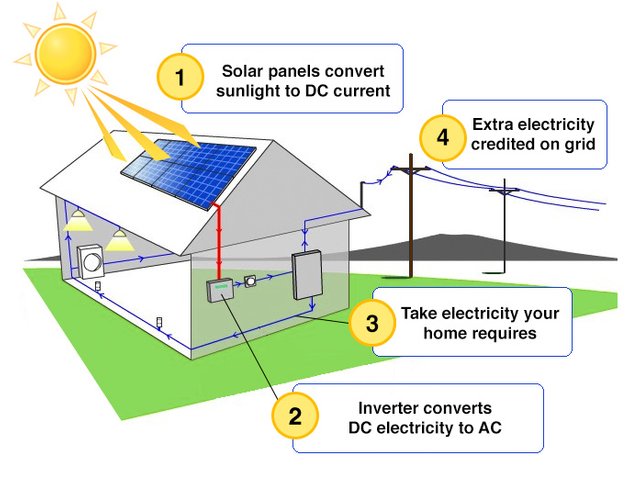
I am going to explain how a portable home solar power system works in the simplest way possible. When the sun shines on a solar panel, the solar energy is converted to direct current (DC). Because sun energy fluctuates, a device known as solar charge controller controls the direct current produced by the panel.
This direct current is either used directly or stored in batteries. Batteries are charged using direct current. But because most devices in the home use alternating current, a device known as a inverter inverts (changes) this direct current into alternating current. The house load is then connected to this inverter.
So when the sun goes down, the battery now charged, supplies direct current to the inverter which in turn converts it into electricity for use.
Picture credit
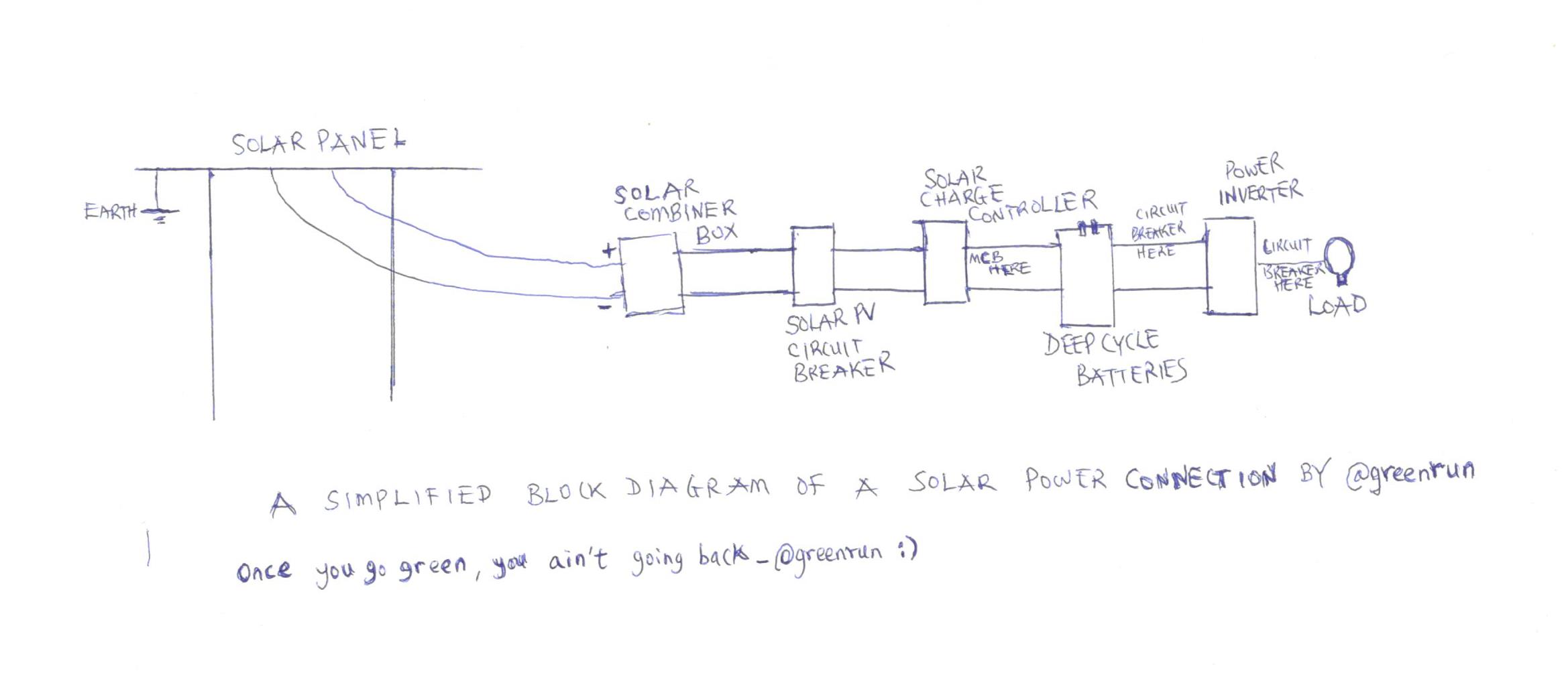
A simplified diagram of a solar power system drawn by me (Oh yeah,I am not an artist <3)
After months of enduring the epileptic public electricity supply, my friend decided to go green. I was there as he started off.
Things he bought:
- 12 Nos of 300w polycrystalline solar panels
- 1 solar combiner box
- 1 150V 80A 7500W 12V 24V 36V 48V 60V MPPT solar charge controller
- 12 nos of 2V 500AH Deep Cycle Batteries
- 5KVA 24V Pure Sinewave Inverter.
- Circuit breakers, breaker box, copper cables, cable lugs, cable joiners, etc.
He started off by clearing the location he planned to install the panels.
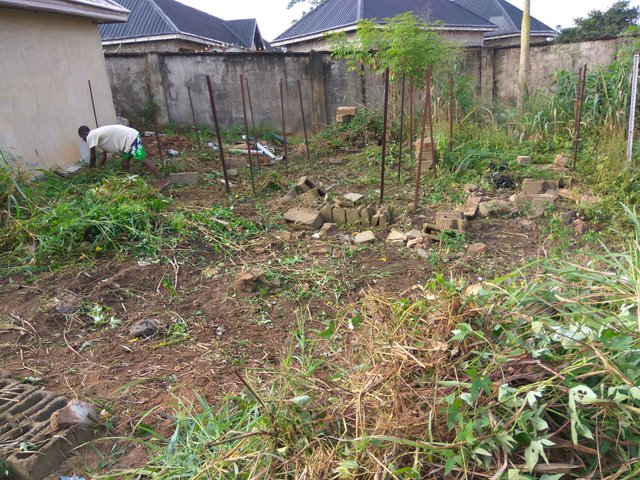
Location of solar panel installation being cleared
Clearing and digging of holes for the wood stand continue
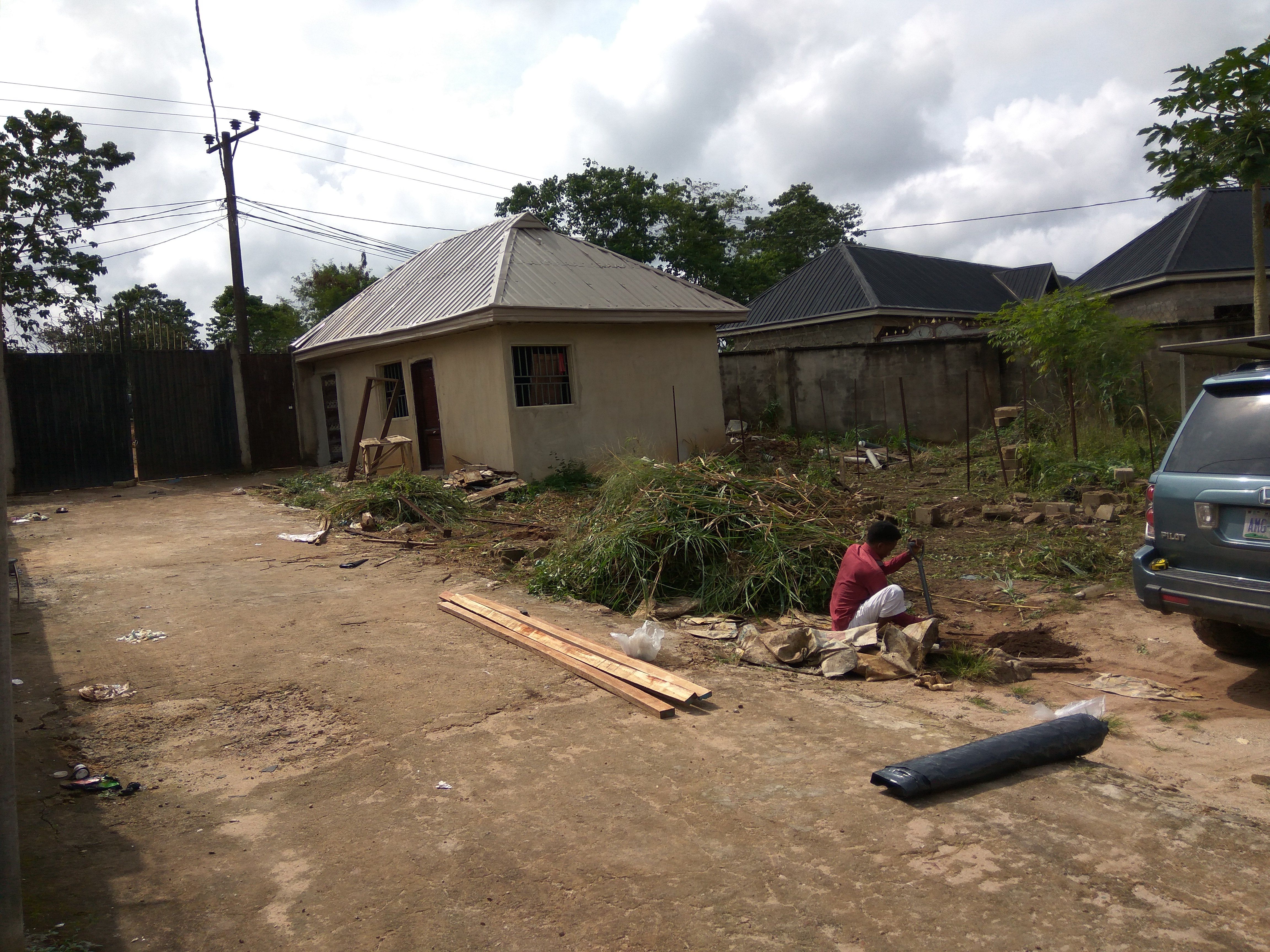
He decided to use wood as it is cheaper and also easily dismantled in the case of relocation. So he bought some pieces of wood
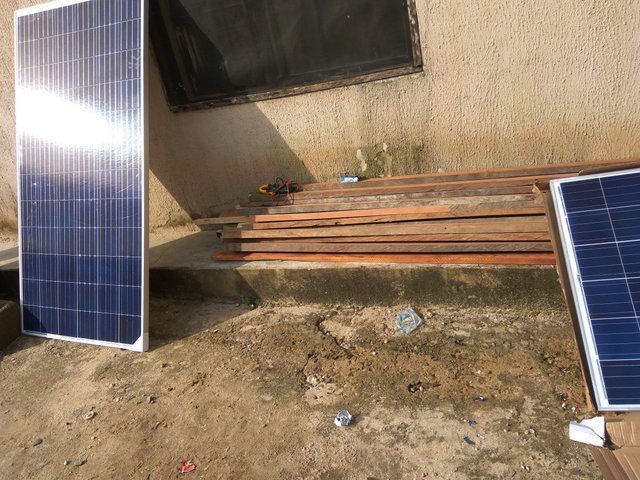
Wood and the new solar panels propped on the wall
Test Time
As the clearing was going on, it was time to test the brand new solar panels to be sure the paper rating corresponds to performance.
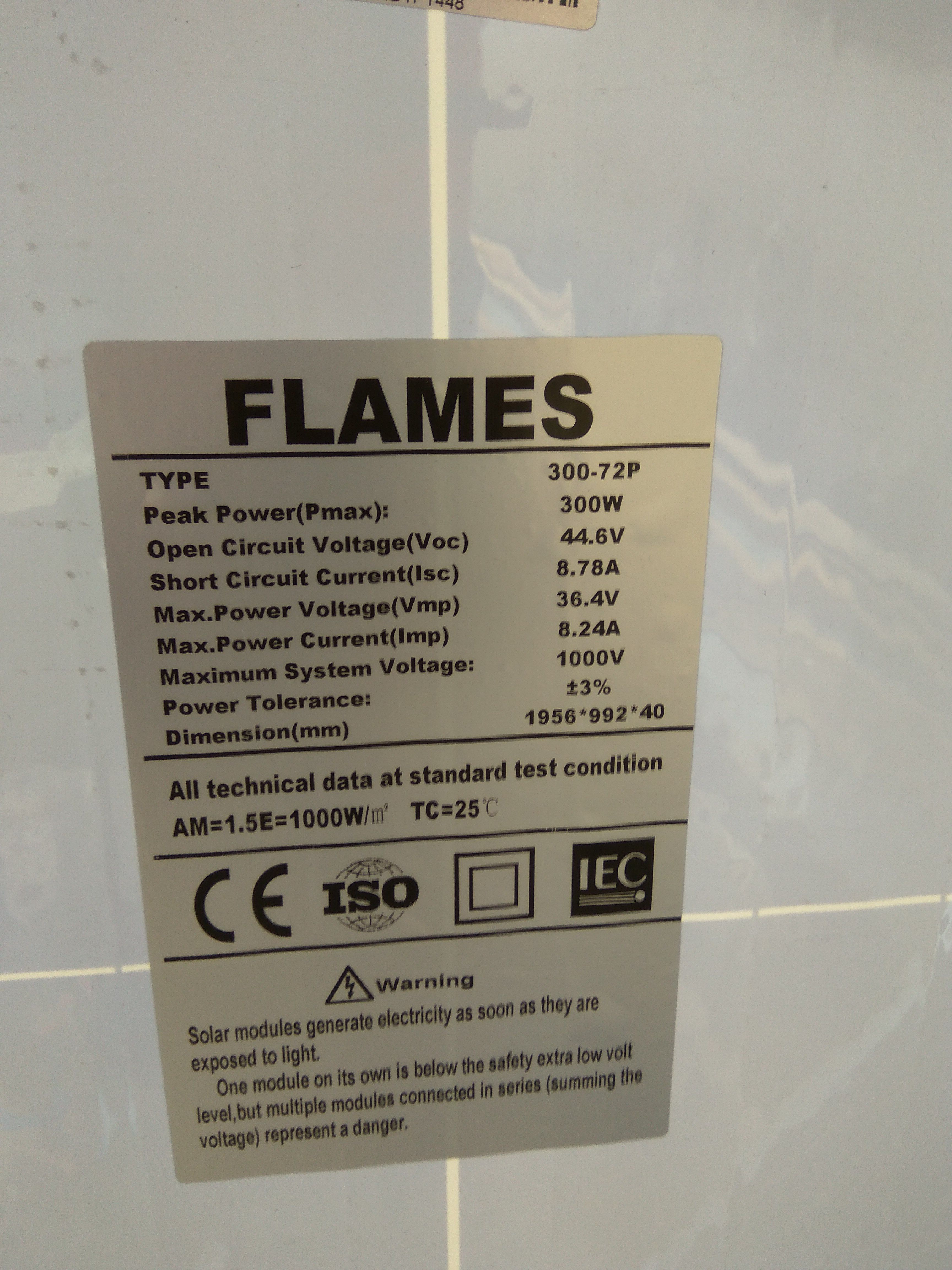
Polycrystalline solar panel technical data
Using a clamp meter the shortcircuit current Isc and the open circuit voltage Voc were tested and the result is as shown below
Result
 | 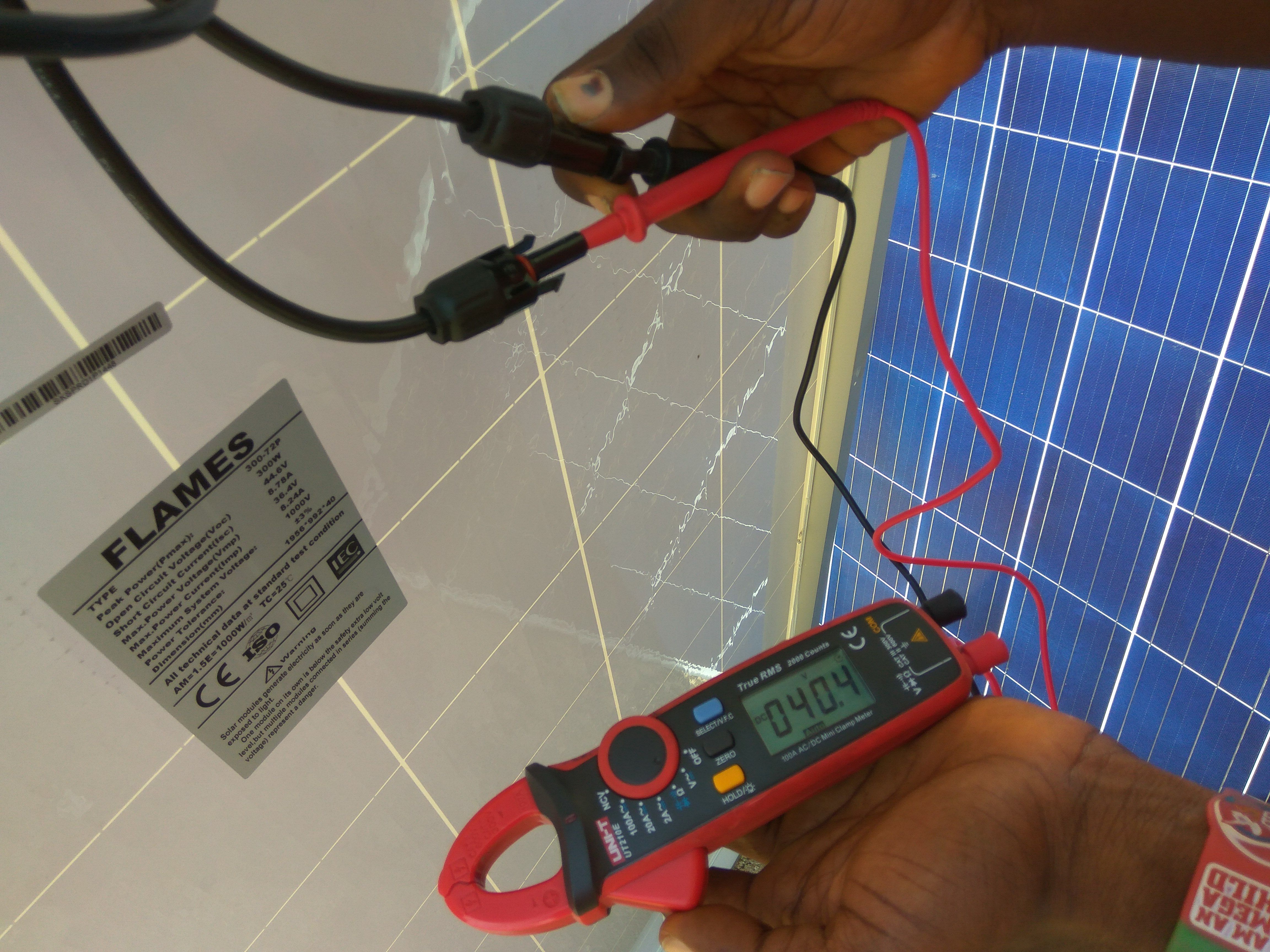 |
| Testing short-circuit current(Isc) | Testing open-circuit voltage(Voc) |
|---|
The result showed 8.39A for short-circuit current and 40.4V for open-circuit voltage. That was against 8.78A and 44.6V in the solar panel's technical data specifications. That was close enough, and this test was done in the morning when the sun is not that high. So the solar panel is qualified to be put to use.
The wooden support is now taking shape. The guys at work are just people he knew. We are all a fan of DIY :)
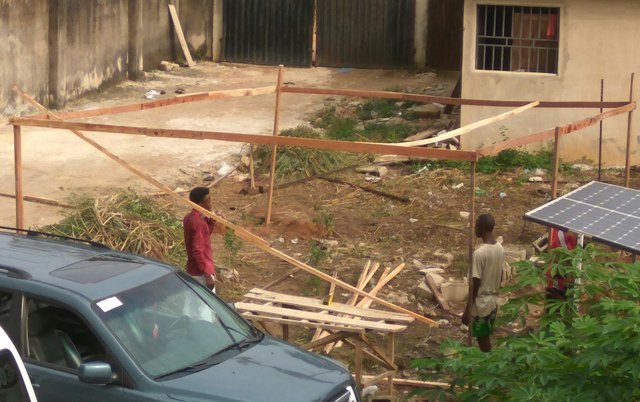
Wooden support almost finished
Solar panels placed on top and the electrical connection is now in progress
![]()
After all the connections are done here, the cables are joined using a solar combiner box. What happens here is all the cables from the solar panels are joined here. By the end of the day, only two cables leave here to the solar charge controller.
This was shown below.
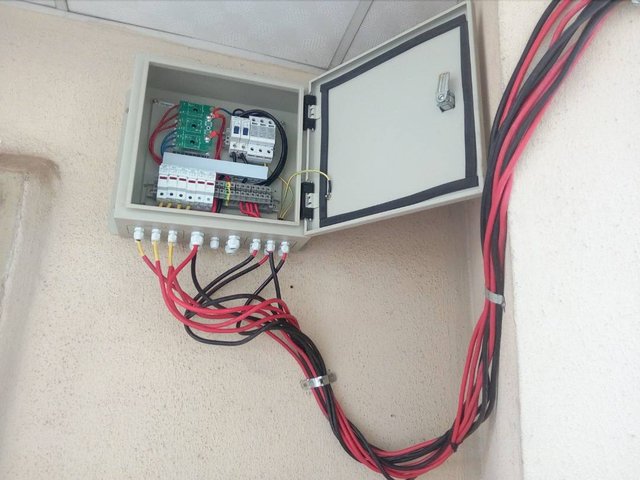 | 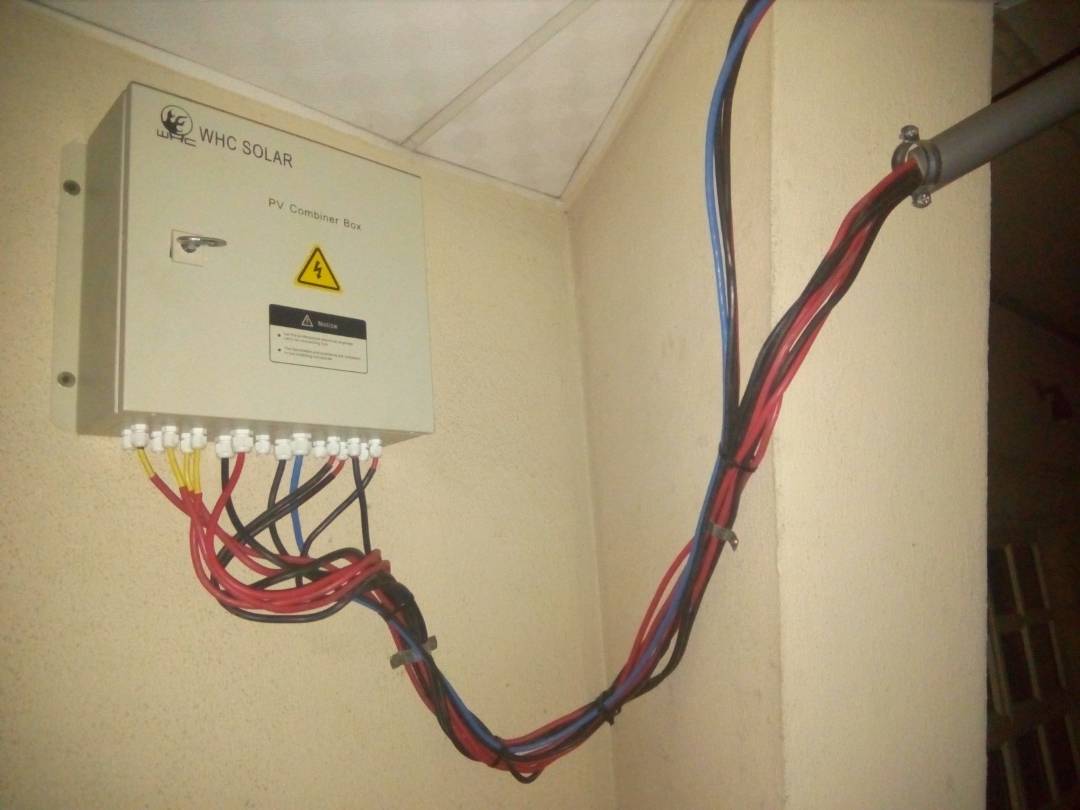 |
| Combiner box (Connection in progress) | Combiner box (Connection done) |
|---|
Solar panel connection is all done now and the panel even serves as his car park. Sweet!
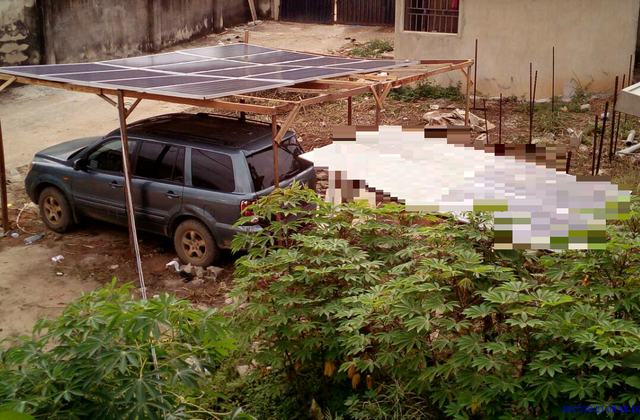
A car park is born
The charge controller and inverter were connected and the job is done. I just found out I missed taking a picture of the batteries.
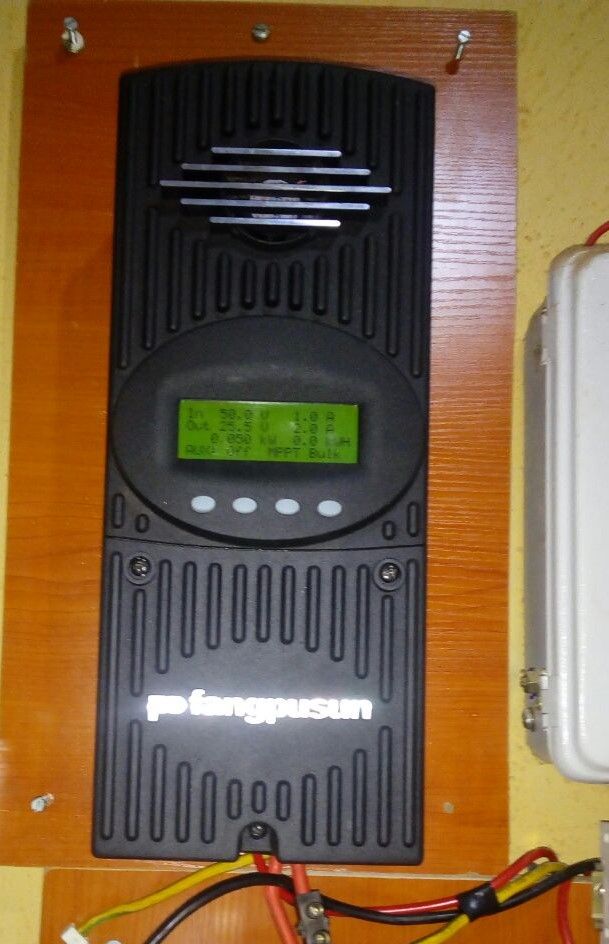 |  |
| 80A 150V 7500W MPPT solar charge controller | 5KVA 24V Pure sinewave inverter |
|---|
You can ask any question below on solar or renewable energy or about going green. I would try my best to answer.
@greenrun .....still running :)
You make it seem easy. Thanks for sharing. Unfortunately most people scare easily when they gear the cost of solar panels and batteries especially since these things are imported and the Naira does not exchange favourable either dollars and Yen. Still, solar power is much better than running the low power generators most households run and it is good for our only home, earth. Thanks for sharing.
You should do more on how someone can start from scratch and and install a portable system, where they can get the tools they need and how they can get help. More people should go green especially here where the utilities are unable y to stay up for up to 50% of the time.
Yeah, cost of materials usually scare people from embarking on a solar project. But in the long run you are better off with it as it would be cheaper and safer than running a petrol generator. Solar panel are known to have a lifespan of 25 years. I've seen one of 10 years working real good. Thanks for your comprehensive reply to this post.
This is super-duper awesome! I have often thought that it would be great if more Africans used solar power as it reduces their monthly costs and allows for same stability and independence.
But solar powers are so expensive, and because of poverty theft is unfortunately not uncommon in many African countries. I myself would be very fearful of people coming in the night to steal this man's (expensive) solar panels away from him to sell for money. These panels could fetch hundreds of dollars which would be a honeypot for many people living in poverty.
When I visited Africa it was clear to me that if you have some wealth in any shape or form, you had better have a house with a big fence around it and barb wire on top of that fence. Ideally, a guy walking around with a gun too.
So taking that combined, solar power may only be beneficial to those who are already better off than their fellow Africans. Which is a pity :(
Solar panels are expensive no doubt, but the adoption rate is so small that no one thinks of stealing it. It is almost like stealing sunglasses in the land of the blind :)
You can see how low it was mounted with little thought of security in place. No one would go out to steal something that would be hard for them to sell.
We have the sun, but unfortunately not many know the importance of solar. Even those who could afford it. Most usually check the cost of the alternative; gasoline generator. They often think short term, forgetting the long-term benefit of using it.
Thanks for your contribution.
Oh but I don't think they would steal it in order to use it themselves. They'd simply steal it and sell it for a couple hundred dollars. That would be a big prize for people who have nearly nothing.
While adoption of solar in Africa may be low, in my experience Africans are not so out of touch with the world that they don't know that solar panels (or other stuff) are valuable.
I suppose it differs between countries; the amount of poverty and culture.
My experience with Africa has been Zimbabwe/Tanzania/Botswana (awesome countries, awesome people) so I base my views mostly on what I saw and experienced there.
Theft is not much of an issue here.I have witnessed a fallen solar street light that stayed months on the ground on a lonely road. No one thought it necessary to steal it. People may know it's valuable, but I guess it is a technology that most are yet to adopt. So, stealing one may not be an easy venture in terms of disposal.
Also, many solar users are not quick to buy fairly used solar panels as it may be gotten illegally from the government since they run the biggest solar projects, and nobody wants a problem with the government :)
I sure hope nobody steals it, in any case! Being self-sufficient in energy sounds like a great plan in any country, but maybe particularly so in Africa.
Did you ever hear of that guy in Malawi who built a wind power generator from scratch by reading how to do it on the internet? A bit more primitive but I thought that was cool too: https://www.ted.com/talks/william_kamkwamba_how_i_harnessed_the_wind
Yes, I have watched this Ted talk and read about him. Almost with zero knowledge of electricity. We have gifted individuals here. There is a guy that builds RC Quadcopter using the different salvaged part from radio mechanics. He has a zero diploma in electronics or engineering!
Would it not be more efficient to angle the panels and orient them to best collect the sun's rays, rather than on a flat-top roof?
The panels was oriented to the magnetic south. At that orientation, it has the most inclination to the sun since it is a fixed object. It would have been more efficient if it is a smart system that tracks the sun like this one below
The roof is NOT flat. There is an degree of tilt, about 84°
ah. thanks for the drawing. I think some people do not realize different latitudinal locations require different angled solar panels.
You are most welcome.
Oh cool. Yeah maybe you can install a rotary system in the future. I'd like to see some reading as to the efficiency over a month or something
@mobbs, I would definitely check for reading in due course. Making a rotary system is doable but much costlier and would make the system more complex but with the advantage of more efficiency in sun's harvest.
depends how far from the equator one is. The solar zenith angle (angle of inclination of the sun) varies depending on time of day and also time of the year. The further from the equator one is the more extreme this angle is. If you are on the equator the best angle for an average daily exposure is 0 degrees.
Good point yeah hadn't thought of that, insightful!
nathenial, we are quite close to the equator here, hence the choice of angle of tilt chosen for this fixed system.
Hello @greenrun in an ordinary Nigerian man's language, let's assume i am staying in a 2bedroom apartment, with
A fridge+ deep freezer, split unit, LCD tv, home theater and some other little house appliances how much do you think it gonna cost me to power them with solar power
Giving cost of solar power system is a difficult one without knowing the estimated power consumption of devices to be on it and the number of run hours of backup. Also the quality of material can make a huge difference betwen the cost of a few thousand naira to a six-figure naira value.
Selling out surplus electricity production can make some contribution in monthly budget
The guy uses a lot of power, he is planning on going off grid and this his 3.6KW is a bit insufficient. So, no selling. Thanks.
thats so interest..
nice post
Thanks for joining us here.
nice innovation
Thanks a lot.
wow, this is very interesting. I have to admit, its a little unconventional but thats an awesome set up! Im guessing your close to the equator hence the near horizontal set up.
Yeah, less than 500 miles to the equator.
Yes a healthy and environment-friendly source of power, though expensive initial costs. You must be an engineer to have been able to break it down so simply. A good job dear.
Thank you.It is surprisingly environmentally friendly and only has a high initial cost for setup. But within months of setting up, the system pays for itself. Thank you for reading.
This is fascinating. It's one thing to hear that solar is the future from tech leaders, but another thing entirely to see someone on the ground implementing it for their own use. Great work documenting this!
Yeah, people do implement it daily and many more would like to implement it if not for the cost constraints. Welcome to steemit. I hope you have an amazing journey. The name on your profile reminds me of the movie Transformer. Have an awesome day.